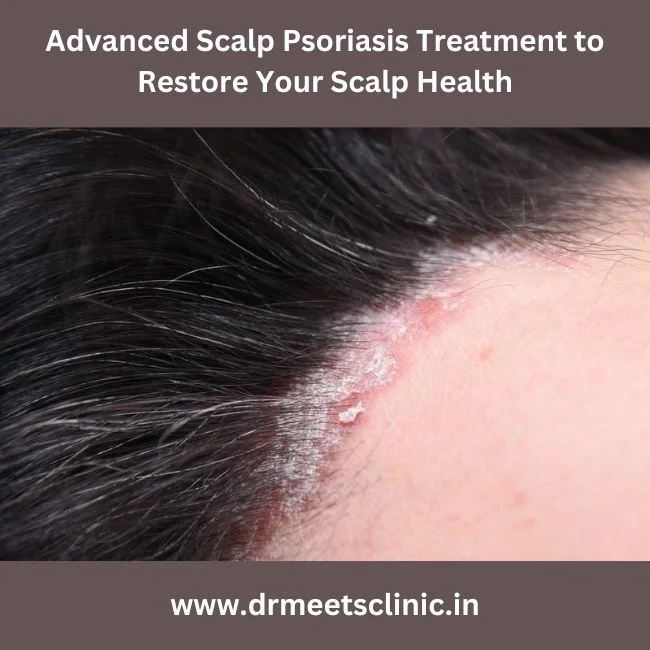Your scalp is more than just the foundation for your hair — it’s a vital part of your skin’s ecosystem. When it becomes irritated, itchy, or flaky, it can impact your comfort, appearance, and confidence. One of the most common and challenging scalp conditions people face is scalp psoriasis. Thankfully, with modern dermatological advancements, scalp psoriasis treatment has become more effective and accessible than ever before.
If you’ve been struggling with constant itching, scaling, or flaking on your scalp, this blog will help you understand the condition, its causes, symptoms, and the best available treatments to regain a healthy, itch-free scalp.
What Is Scalp Psoriasis?
Scalp psoriasis is a chronic autoimmune condition that speeds up the life cycle of skin cells. Instead of shedding naturally, skin cells accumulate on the surface, forming thick, scaly patches that can be white, silver, or red. It commonly affects the scalp but can also extend to the forehead, neck, and behind the ears.
This condition is not contagious, but it can be persistent and emotionally distressing if not treated properly. Early and consistent scalp psoriasis treatment helps manage symptoms, prevent flare-ups, and improve scalp health.
Common Symptoms of Scalp Psoriasis
The symptoms of scalp psoriasis can range from mild to severe and may vary from person to person. Some of the most common signs include:
-
Red, inflamed patches on the scalp
-
Thick, silvery-white scales covering affected areas
-
Intense itching or burning sensation
-
Dryness and flakiness (often mistaken for dandruff)
-
Temporary hair loss due to constant scratching
-
Cracked or bleeding skin in severe cases
If you experience these symptoms frequently, consulting a dermatologist for scalp psoriasis treatment is essential. Self-medication or using random anti-dandruff shampoos can worsen the condition.
Causes and Triggers of Scalp Psoriasis
While the exact cause of psoriasis is not fully understood, it is primarily an immune system disorder. The immune system mistakenly accelerates the production of skin cells, leading to the buildup of scales and patches.
Several factors can trigger or worsen scalp psoriasis, such as:
-
Genetic predisposition (family history of psoriasis)
-
Stress and anxiety
-
Cold or dry weather
-
Infections (like strep throat)
-
Certain medications (like beta-blockers or lithium)
-
Skin injuries (cuts or sunburn)
-
Excessive alcohol consumption
Identifying and managing these triggers is a crucial part of an effective scalp psoriasis treatment plan.
Effective Scalp Psoriasis Treatment Options
The goal of treating scalp psoriasis is to reduce inflammation, slow down skin cell production, and relieve itching and discomfort. Treatment depends on the severity of the condition and how your scalp responds to various therapies.
Here are some of the most recommended scalp psoriasis treatments available today:
1. Medicated Shampoos
For mild to moderate scalp psoriasis, dermatologists often start with special medicated shampoos containing coal tar, salicylic acid, or ketoconazole. These ingredients help reduce scaling, itching, and inflammation.
Usage Tip:
Apply the shampoo to the scalp and leave it on for 5–10 minutes before rinsing to allow it to work effectively.
2. Topical Corticosteroids
Corticosteroid creams, lotions, or foams are powerful anti-inflammatory medications that reduce redness, swelling, and itching. They are among the most common scalp psoriasis treatments prescribed by dermatologists.
Usage Tip:
Apply only as directed by your doctor. Overuse can thin the skin or cause side effects.
3. Vitamin D Analogues
Synthetic forms of vitamin D, such as calcipotriol or calcitriol, help slow skin cell growth. They are often used in combination with corticosteroids for enhanced results.
Benefits:
-
Gentle and effective for long-term use
-
Reduces scaling and inflammation
4. Phototherapy (Light Therapy)
In cases where topical treatments don’t work effectively, dermatologists may recommend phototherapy, a proven medical treatment that exposes the scalp to controlled ultraviolet (UV) light. The light slows down excessive skin cell production and reduces flare-ups.
Benefits:
-
Safe under medical supervision
-
Reduces scaling and inflammation significantly
5. Systemic Medications
For severe or resistant cases, oral or injectable medications may be necessary. Drugs like methotrexate, cyclosporine, or biologics target the immune system to reduce psoriasis symptoms from within.
Benefits:
-
Ideal for widespread or stubborn psoriasis
-
Offers long-lasting remission
Note:
Systemic medications should only be used under strict dermatological supervision due to potential side effects.
6. Natural and Home Remedies
While medical treatment is essential, some home remedies can help soothe symptoms alongside professional care. These include:
-
Aloe vera gel: Calms inflammation and hydrates the scalp
-
Coconut oil: Softens scales and reduces dryness
-
Apple cider vinegar (diluted): Relieves itching and scalp buildup
-
Oatmeal masks: Help reduce irritation
Note:
Always consult your dermatologist before trying home remedies to ensure they don’t interfere with your ongoing scalp psoriasis treatment.
Managing Scalp Psoriasis: Lifestyle Tips
Beyond medical treatment, daily care plays a major role in keeping symptoms under control. Here are some dermatologist-approved tips:
-
Keep your scalp clean and moisturized with gentle products.
-
Avoid scratching, as it can cause bleeding or infection.
-
Use lukewarm water while washing your hair.
-
Reduce stress through yoga, meditation, or regular exercise.
-
Eat a balanced diet rich in omega-3 fatty acids, fruits, and vegetables.
-
Avoid harsh hair products with alcohol or fragrance.
These habits can complement your scalp psoriasis treatment and help maintain healthier skin over time.
When to See a Dermatologist
While mild scalp psoriasis may respond to over-the-counter shampoos, moderate to severe cases require professional care. You should visit a dermatologist if:
-
You experience constant itching and flaking
-
The condition causes hair loss or bleeding
-
OTC treatments fail to work
-
The psoriasis spreads beyond the scalp
A dermatologist will assess your condition and create a personalized scalp psoriasis treatment plan using a combination of topical, oral, and lifestyle approaches.
Can Scalp Psoriasis Be Cured?
There’s currently no permanent cure for psoriasis, but it can be effectively managed. With proper treatment, flare-ups become less frequent and less severe. Many patients enjoy long periods of remission where symptoms disappear completely.
Modern scalp psoriasis treatments, combined with a healthy lifestyle and consistent care, can make living with this condition far more manageable.
Conclusion
Scalp psoriasis can be physically uncomfortable and emotionally draining, but you don’t have to live with it in silence. With early diagnosis, medical-grade treatments, and the right care routine, you can restore your scalp’s health and regain confidence.
Whether you opt for medicated shampoos, phototherapy, or advanced biologic treatments, remember that consistency is key. Always consult a qualified dermatologist for a personalized scalp psoriasis treatment plan that suits your skin type and lifestyle.

















